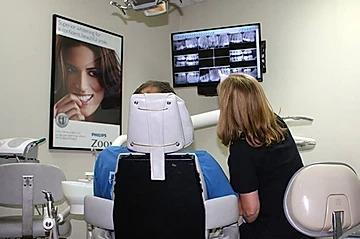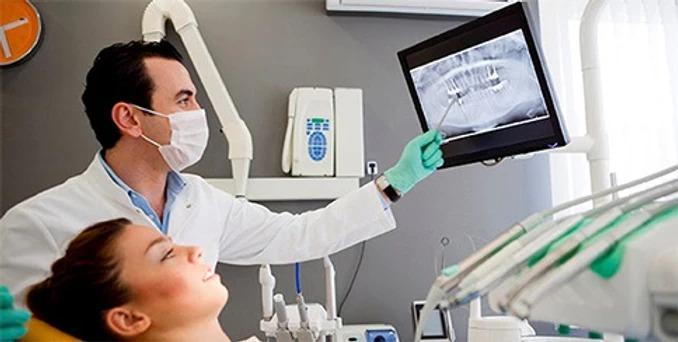
The practice of good oral hygiene is something that the medical community is evaluating with respect to maintaining good overall health. Recent studies have shown that there are clear connections between degenerative oral disease and disease throughout the rest of the body. Knowing this, it is essential that care and treatment is given to the mouth as part of a comprehensive health plan.
X-rays, or radiographs, are an essential part of any good dental health plan. They are both diagnostic and preventative, as they allow dentists to treat areas of concern that already exist, and they alert caregivers to issues that may contribute to future decay. With the addition of x-rays to a patient’s treatment plan, dentists can proactively develop plans for both preventative and restorative care. Through the study of x-rays, if it is found that no conditions exist, a patient can then rest assured that a thorough examination has been done.
Why Are X-rays Needed As Part Of My Care?
X-rays are a valuable tool dentists use to diagnose, treat, and prevent further decay and degeneration of the oral cavity. They give dentists the ability to see not just the surface of your teeth, but also the soft tissues, nerve systems, and even the bone structure of your mouth. Dental x-rays are used to expose any degenerative disorders you may be experiencing, and also to catch and even prevent areas that are prone to decay and infection.
X-rays are used to detect and treat the following:
Cavities and other forms of decay and disease in the mouth
The presence of cysts, abscesses and other unusual growth in and around the mouth
Structural abnormalities such as bone spurs, misaligned wisdom teeth, etc.
Periodontal disease and decay
Connections between oral disease and other diseases present in the body
Finding any abnormalities early is the key to effective treatment. Patients who receive regular care and x-rays tend to receive preventative rather than reconstructive treatment, and they most certainly spend less time and money at the dentist.

Types of X Ray Technologies Used In Dentistry
Periapical, bitewing, and panoramic technologies are all used to detect dental issues for patients undergoing x-rays. Bitewing film generally shows the areas in and around the crowns of teeth--these are primarily used to detect signs of decay on and in between teeth. When needing a little deeper look at roots or bone height, a dentist will use periapical x-rays. A panoramic film is an overall look at the oral cavity. This panoramic view is effective for detecting structural abnormalities, unwanted growth, missing or impacted teeth, and disorders of the mouth and jaw. Occlusal x-rays are used to detect growing teeth for small children, and cephalometric films are used to plan and administer orthodontic treatments. All are necessary components of providing optimal dental care.
When Do I Need X-Rays As Part of My Dental Care?
Each patient’s treatment needs are unique; your dentist will work with you to determine the type of x-rays needed for your situation as well as the number of films needed to plan treatment. If you are a new patient, or someone that is in need of immediate treatment, your dentist may advise a more comprehensive set of films to determine what your needs are. As a baseline for good oral health is established for you, fewer films will be needed to continue your treatment plan.
Isn’t X-Ray Radiation Dangerous To My Health?
Dental x-ray technologies are designed to minimize risk of radiation for you, the patient, as well as your caregivers in the dental office. Many modern dentists are now using digital technology, which further reduces any risk of radiation. Some dental professionals still require the use of a leaded apron for patients with abdominal or thyroid issues. Make sure to tell your dentist if you are pregnant or breastfeeding, as it is important to minimize risk for women in these situations. With the development of new and innovative technologies, the risks of radiation reduce significantly, and soon there might not even be a need for disclaimers with regard to radiographs and radiation.

Designing A Successful Dental Care Plan For You
Remember that the patient, starts with a good oral hygiene routine at home. Regular brushing, flossing, and self inspection are keys to preventing infection and disease. Part of your care routine should include scheduled trips to your dental professional, as well as regularly scheduled x-ray films to detect any problems that arise. Adding x-rays to your treatment plan will ensure that problems are detected early enough to be treated. If you do not catch dental problems, you will be sure to spend more time and money on restoration than you planned. Adding regular x-rays to your regime to determine your oral health will show the bigger picture, and allow you to maintain excellent overall health.
The professional staff at the office of Dr. Gordon Krueger is trained to provide you with a comprehensive care plan that is unique to your dental health. It is important to establish a regular relationship with the most professional and caring team of dental experts. In St. Petersburg, Florida the community is fortunate to have one of most highly skilled dentists and periodontists in the nation.
In a study and follow-up article by DentalTown, one of the leading dental blogs in the country, there is no question that ‘corporate-managed’ dental care is on the rise. At present about 50% of dental care in the U.S. comes from these profit-first clinics. The real question is when it comes to your dental health---what is most important to you? Corporate managed chains, according to DentalTown reward their dentists by how fast they can move patients through their system, and they actually set projected dollar minimums on each patient of “work that the dentist should find,” to practice with them.
Dr. Gordon Krueger’s Tampa metro practice hires and retains only the highest, most talented and caring professionals to staff his office, with one dental assistant a teacher from a local dental school. Dr. Krueger himself has the reputation as a perfectionist, and each client is cared for as if they were the only client. Isn’t that the care that you and your family deserve?








